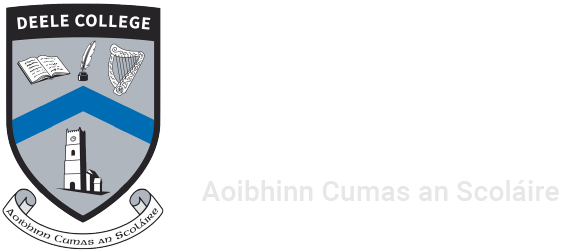Teaching and Learning is our core purpose at Deele College.
Through the School Self Evaluation (SSE) process we continually strive to enable all students to reach and surpass their academic targets whilst supporting them in developing the skills and qualities that they need to be successful in later life. Our DEIS plan outlines clear and effective targets and actions for both staff and students which will ensure a consistent approach that enables all learners to achieve within the classroom and in the wider school environment.
Our Self-Evaluation Report and Improvement Plan
In the last year, we have looked at teaching and learning in our school to find out what we are doing well.
This is what we discovered:
- The main strengths of the school are the quality of teaching and learning and the willingness of staff to embrace and share good practice. Good in-school communication systems support a collaborative approach to developing teaching and learning practice.
- We have engaged in the development of successful teaching and learning initiatives such as a whole school approach to improving literacy and numeracy. The findings suggest that literacy and numeracy levels have improved among our first year students.
- Teachers focus on the development of knowledge, content and subject-specific skills during their lessons. Teachers recognise the importance of students becoming reflective, responsible learners who are positive about their own learning.
- Lessons are taught in a supportive learning environment. Supports are provided for appropriately identified students such as literacy and numeracy, curriculum support and personal development. Differentiation is used to cater for the needs of all students of different abilities.
- Students are happy with their progress in school and they enjoy classes that use active, student centered learning methodologies. Three cohorts of teachers have received training in Instructional Leadership.
- Teacher have engaged in continuous professional development which assures a high level of expertise and enables teachers to keep their professional skills and knowledge up-to-date.
- The rapport between students and staff is very good and the whole school commitment to wellbeing and student welfare is prioritised. There are excellent student supports in place especially pastoral care provision.
- Attendance and retention strategies are working successfully to improve participation and engagement in class.
- The school’s self-evaluation process is of a high standard. A comprehensive analysis of data has informed the judgements made by the DEIS core team.
This is what we did to find out what we we’re doing well, and what we could do better:
- School self-evaluation process- analysis of DEIS targets and actions.
- Feedback from subject department meetings
- An analysis of Junior and Leaving certificate results
- Google surveys of parents, students and teachers. (SSE)
- Informal feedback from parents, students and teachers.
This is what we are now going to work on:
- The SSE team (2017-2020) is now focusing its work on teaching and learning initiatives to promote student’s critical thinking skills and engagement in class which will feed into the school’s DEIS targets. These initiatives will be implemented on a whole school basis and discussed at subject department meetings, thereby ensuring the sharing of best practices and experiences.
- Targets and actions have been set in each of the 8 key areas of DEIS; Numeracy, Literacy, Attendance, Retention, Partnership with Parents, Partnership with Parents, Examination Attainment, Educational Progression.
Our teaching and learning initiative aims to:
- Implement the key skill ‘Being Creative’
- Enable learners to develop their imagination and creativity
- Encourage questioning, curiosity and exploration
- Enhance the learning experience for students
- We are engaging with the ‘Digital Learning Framework’ to embed digital technologies further in teaching, learning and assessment.
- We are working to embed Formative assessment strategies. Teachers will use learning intentions in each lesson i.e. what the teacher wants the students to know, understand, and be able to do as a result of learning and teaching activities. The use of success criteria will allow students to understand what success looks like. This will help the teacher and student to make judgements about the quality of student learning.
This is what you can do to help:
- Talk to your child about their classes and how they are engaging in their classwork and homework
- Encourage your child to take responsibility for their learning and their progress.
- Please check student journals at least once a week and sign them.
- Use the student journal to highlight areas of concern.
- Keep in contact with the class tutor and year head.
- Attend all information meetings in the school.
- Discuss monthly assessments, Christmas and summer exam results with your child.
- Support your child to be on time to class and attend school every single day.
- Arrange appointments for after school where possible.
- Respond to any request from the school for feedback in the form of surveys, focus groups or other means of gathering information. We are partners in your child’s education and your voice is important in informing future planning in the school
